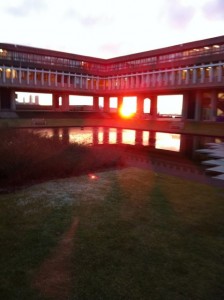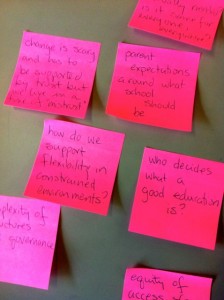Posts Tagged ‘Teaching Assistant’
An Announcement in Two Parts – Part 1: Not This Time
Three years ago, I put my name forward as a candidate in the 2011 municipal elections. I ran for the position of Trustee on the West Vancouver Board of Education and was honoured when voters in this community elected me to serve in that capacity.
My foray into electioneering also marked my social media debut outside the comfort zone of Facebook.
I dove into Twitter, a platform with which I’ve become very comfortable and which is now a part of how I absorb, consume, and contribute to media on a daily basis. It has also allowed me to create an invaluable network of connections.
After a long time of saying, “I would like to start a blog,” the election also spurred me to start one which I called The Comfort of Why. The best explanation for this title can be found in the speech I made at the first all-candidates’ meeting in 2011 where I said:
I take great comfort in the question why. As long as I’m asking why, I’m thinking, I’m reflecting, I’m challenging. I am looking for answers rather than assuming I have all the answers. I’m seeking information rather than dictating the way that things ought to be perceived.
To me, this questioning is not about undermining a system and disregarding the work that’s been done. It’s about validating what you believe, being responsive and strategic — making changes when they’re needed, when they’re necessary, and making them at the right time.
My first blog entry was posted on October 19, 2011, and it was comprised almost entirely of questions including this one:
Consider, too, that the BC Ministry of Education is pushing the concept of “personalized learning in the 21st century”. Why? What does it mean?
My position at the time, in regard to this particular question, was as follows:
Well, I want to be at the table to make sure that if there’s an overhaul of the system it’s done well and it’s done right. That it’s implemented in a way which benefits all students.
After three years of being at the table, I still feel this is a valid question and one that is not being addressed at a provincial level.
I still want to have this conversation. In fact, I feel we must have this conversation if we are to continue to offer our children the best opportunities to learn, to grow, and to find their way in the world.
While I recognize the valuable work that our Board has done in the past three years, in collaboration with the District Leadership Team, our education partners, our educators, and all our employees, I will not be seeking reelection in 2014.
Why?
There are a number of factors, but let me focus on three key points.
First, West Vancouver is a community with such depth of talent and with many actively engaged residents who are passionate about education. The deadline for nominations is tomorrow and already seven candidates have filed their papers which means we will have a dynamic and substantive campaign featuring a diverse range of opinions from individuals who all have much to offer.
Second, the most recent job action was very instructive and there are many lessons to be learned in how it played out. One of the most significant learning outcomes for me was to recognize that in order to move the provincial government into action on education, we need much greater direct engagement from the public. That citizens’ voice has to be galvanized if we want to ensure that education is a prominent, if not THE, election issue in 2017.
Finally, education in British Columbia has become such a polarized — and polarizing issue — that what we don’t talk about is education. This discussion — the conversation I’ve always said I wanted to see happen — has been drowned out by criticisms and accusations, by duelling press conferences and media soundbites, by job actions and political posturing.
It’s time that we, as citizens and voters, speak up and get what we want for our children, our society, and our future.
I have some ideas on how we might do just that.
Watch for Part 2.
What Is The Purpose of Education?
It was a very interesting day to hear Susan Lambert speak.
It was the day teachers throughout British Columbia were voting on whether or not to ratify a new collective agreement, one which fell short of expectations and which merely represented the achievable at this moment in time.
While it was a difficult deal for educators to accept, one of the most important achievements for the BC Teacher’s Federation (BCTF) in the new agreement was the preservation of the integrity of their court case on class size and composition.
And Susan Lambert, who had other reasons for looking askance at the proposed agreement, knows how critically important that court case is for the future of public education in BC.
For those who may not know, Susan Lambert is the past president of the BCTF and a long time educator having started her teaching career in 1973/1974. She is also an alumna of the Faculty of Education at Simon Fraser University (SFU).
And that’s how I happened to be in the audience to hear her speak. She was addressing an education class at SFU, a class in which my nephew is enrolled.
Yes, I have a nephew who is currently pursuing an undergraduate degree at SFU and whose long-term plan is to become an educator.
I not only support his choice, I celebrate it because no matter the hardship and the challenge, being a teacher, in my view, remains one of the most fundamentally important roles in society.
My nephew’s professor had invited Ms. Lambert to address his students and had told them guests were welcome. When my nephew extended the invitation, I jumped at it: this was not an opportunity I was going to miss.
Why?
Because while I may not agree with Ms. Lambert on any number of issues, she is a passionate advocate for public education. Not only that, but she is a firm believer in making the world a better place, particularly for those who are most disadvantaged in our economic system.
She is also someone worth listening to because of her experience in BC’s public education system and because of her commitment to advocacy.
At the beginning of her presentation, Ms. Lambert challenged the students to consider what their purpose was in becoming educators. In other words, she wanted them to consider why it was they wanted to teach. She asked them to consider the question because, as with any vocation or endeavour which we undertake, it is the meaning in what we do and the intent with which we do it that makes our choices purposeful and rewarding in good times and in bad.
I think this is particularly true in a profession such as teaching which is based on relationships and where doing one’s best is instrumental in helping others to achieve theirs.
As much as I appreciated Ms. Lambert’s challenge to the students, it was her summary of the purpose of education which crystallized why the fight for public education in British Columbia is so critical.
And it is simply this: a thriving and vibrant public education system is the essential ingredient for a civil society.
A just society.
An equitable society.
What greater purpose could there be but to work on behalf of a system which is the foundation to a better future for all citizens and not only those who can afford it?
So You’re a TA, eh?
I’m very pleased to be back at Simon Fraser University (SFU) this term as a Teaching Assistant (TA) with the Department of English. I am leading two tutorial sections for English 104W – “Introduction to Prose Genres: Digital Perspectives on Canada’s Media History and Messaging as a Prose Genre” with Dr. Paul Matthew St. Pierre.
For those of you who follow me on Twitter or on Facebook, you may guess why I’m particularly excited about being a part of this course. Given how much time I currently spend on social media, the course is a way to consider my online practice in a historical and cultural context.
I anticipate that the course content will support what I’m doing, it’ll challenge what I think, and it’ll motivate me to ensure my social media activities are pursued in an even more thoughtful manner. With three lectures done already, I foresee that Dr. St. Pierre may be setting the stage for us to consider our time on social media as “work” within the digital sphere and electronic devices as the tools by which we complete that work.
To think of my time online as work adds a whole new dimension to my role as a digital citizen.
Aside from grounding my social media use in this context, I’m really excited about having the opportunity to work with undergraduate students again.
Why?
It’s not because of the marking, which is likely my least favourite aspect of the job, although assessment is important in the university environment.
It’s not for the office I get to use since it’s remarkable how infrequently students stop by to visit.
It’s not for the authority which the position bestows upon me although it’s wonderful to be able to think about the tutorial sessions as “my classes” and those enrolled as “my students”.
It’s because as I work with the students I feel — I hope — I’m making a contribution to their learning. From exhorting them to look up words in a dictionary, to pushing them to care about writing, to asking them to see beyond the words on the page (or on the screen), I’m trying to show them that they have agency in this world.
I want them to know that their agency will be based on their ability to read, reflect, think, challenge, analyze, and communicate. It doesn’t matter what their career aspirations may be, it doesn’t matter which field of work they intend to pursue, it doesn’t matter what subjects they may wish to study, these are the abilities which will serve them well in any career, in any field, in any subject area.
That is, I want them to value learning, I want them to value thinking, and I want them to know that the ability to fully realize their potential depends on their ability to focus on more than just their grades and to look beyond the message no matter the form.
And in working with them, I recognize that I value my work as a TA because it allows me to do the same with regard to my own agency.
It allows me to recognize the following:
- I’m not so much a person who accepts as I am someone who questions.
- I’m not so much a teacher as I am a student.
- I’m not so much a person who imparts knowledge as I am a learner.
For life.
Time May Not Care But I Do
December looms. The last month of the year. I can only wonder how it is that 2013 has just over four weeks to go.
The months have flown by, the year has evaporated. Like the contrails of planes which soar overhead, all that’s left are lingering impressions of passing through space and time. I know I started there and I know I’ve ended up here, but I’ve lost the texture of the days and won’t remember all the details of my experiences along the way.
Time’s not going to hesitate in its relentless march to give me back the days or weeks or minutes or seconds I wasn’t able to enjoy or forgot to savour.
Time doesn’t care, but I do.
Why?
 Because the end of the year means the end of the semester at Simon Fraser University (SFU) and while time may not care that it’s left me breathless with its bruising speed, I do care about having to say goodbye to the students I’ve been working with since the first week in September.
Because the end of the year means the end of the semester at Simon Fraser University (SFU) and while time may not care that it’s left me breathless with its bruising speed, I do care about having to say goodbye to the students I’ve been working with since the first week in September.
There are any number of reasons for me to be ecstatic. Once exams are over and grading is done, I won’t have to contend with the agony of marking. Once the last book has been read and the last office hour held, I may be able to reintroduce balance in my day to day activities. Once the demands have lessened, I might be able to capitalize on a few extra hours of sleep.
I have many reasons to celebrate. But here’s the thing. All of those reasons and more are trumped by this one truth: I treasure working with undergraduates even if they hand in papers late, even if they won’t contribute to a class discussion, even if they haven’t done the reading, even if their writing skills are still in development, and even if they don’t care as much about the course as I do.
Based on concentrated interactions over 12 to 13 weeks, even if it’s just for 50 minutes each week, a connection is established although not with every student and not always successfully. A rapport grows among the members of each tutorial group, a sense of common purpose.
And for me the most rewarding moments are those times during a tutorial session when I can actually see the students thinking. When it seems like they are puzzling over a new idea, a new concept. Of course, they may just be squinting at the clock in anticipation of being released from the torture of sitting in yet another classroom with yet another TA droning on about something or the other. Maybe. But more often than not, I feel they’re giving serious consideration to the material at hand. They are learning and their horizons are expanding.
My time with these students is rapidly coming to an end and I’m incredibly appreciative of the time I’ve been privileged to spend in their company.
It may be brief, it may be over all too soon, but it’s time well-spent.
Connections? Priceless
In today’s opening essay for Q, the CBC radio show, host Jian Ghomeshi remembered Roger Ebert and the interview he conducted with the famed film critic a year ago.
Jian described how concerned he’d felt about his ability to connect with Mr. Ebert in the studio given the latter’s health challenges. “I needn’t have,” he said.
His words this morning paid tribute to the man, but they also served as a testament to the power of connection.
Listening to Jian made me reflect on my own feelings now that the spring term at SFU is drawing to a close. I’m not completely disentangled from my teaching obligations yet: I’m expecting final essays from my students next week.
But there are no further lectures for the course and no remaining tutorials. And that makes me wistful.
Why?
Because the end of the term represents a loss. The connections I’ve forged with my students after thirteen weeks of working together are now tenuous if not severed. I may have gained back time for my own work and my other commitments, but I am no longer a part of these particular journeys, the unfolding lives of these particular individuals.
Since my first stint as a TA, I’ve connected with approximately 120 students. 120 students from a variety of faculties and departments, given the way course requirements are structured at SFU, and 120 students who represent the gamut of undergraduate experience.
Aside from the occasional encounter on campus, I don’t know where they are now or what they are doing or how they are faring.
When I walk around the Burnaby campus now, a movie reel of sorts plays out in my mind: momentary flashes of memories, frames filled with faces, snippets of conversations, disappointments, and noted accomplishments.
The characters of my movies are students: those with strong opinions, those with a sense of humour, those who struggled, those who exceeded their own expectations, and those who were observers yet offered so much when they found the courage to voice their opinions.
The plot revolves around classic texts of Western civilization and delving for insights into the human condition, then and now. Work on writing, developing critical thinking skills, and trying my best to impart the importance of questioning.
A few students have reconnected via LinkedIn and others lurk on Twitter, but these electronic tentacles, in my mind, pale in comparison to the strength of the collective experience of an in-person weekly seminar or a personal visit during office hours.
My experience at SFU has strengthened my belief that the most critical factor in teaching and learning is the personal aspect. Technology may carry us forward into a brave new world where the nature of human interaction is fundamentally altered forever, and learning is transformed into something which I am not yet able to imagine, but for now it remains as it always has been.
The value of educational experiences rests predominantly, as it does for radio interviews, on human connections.


